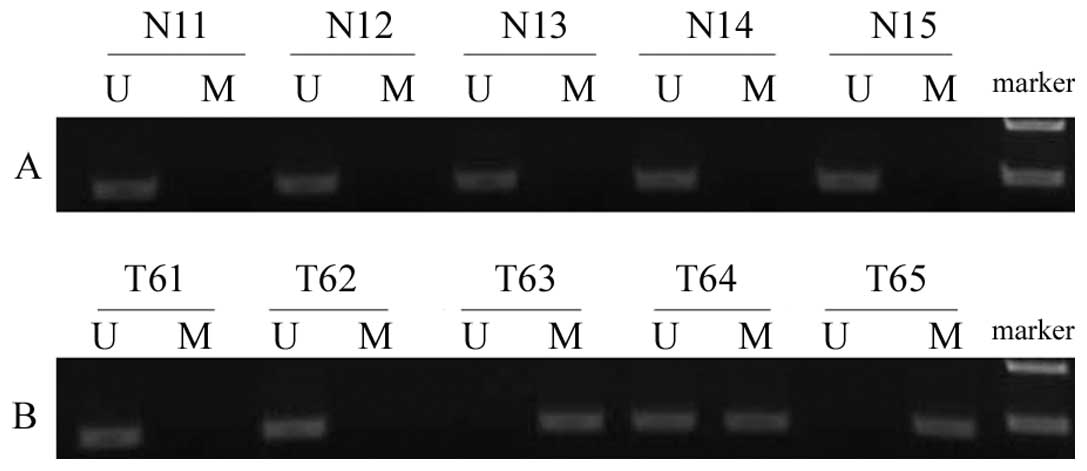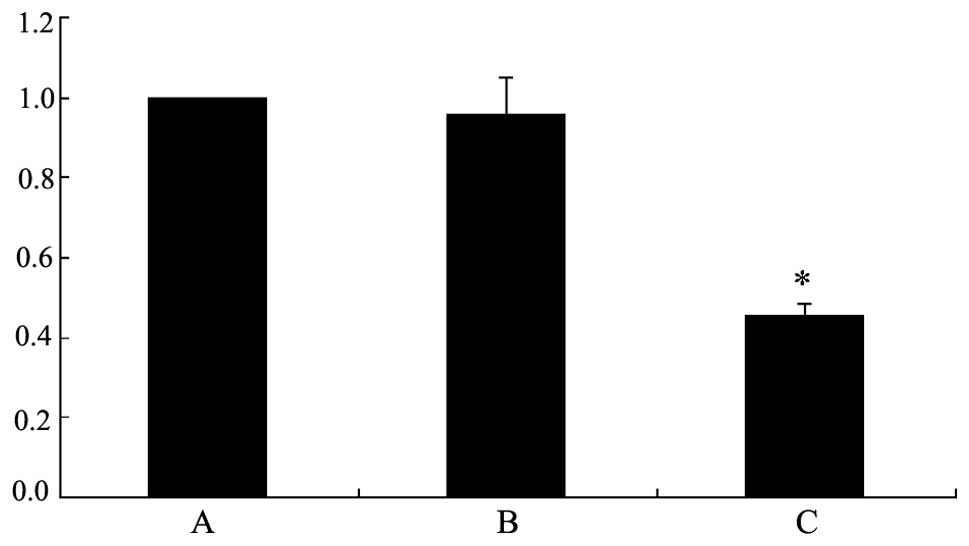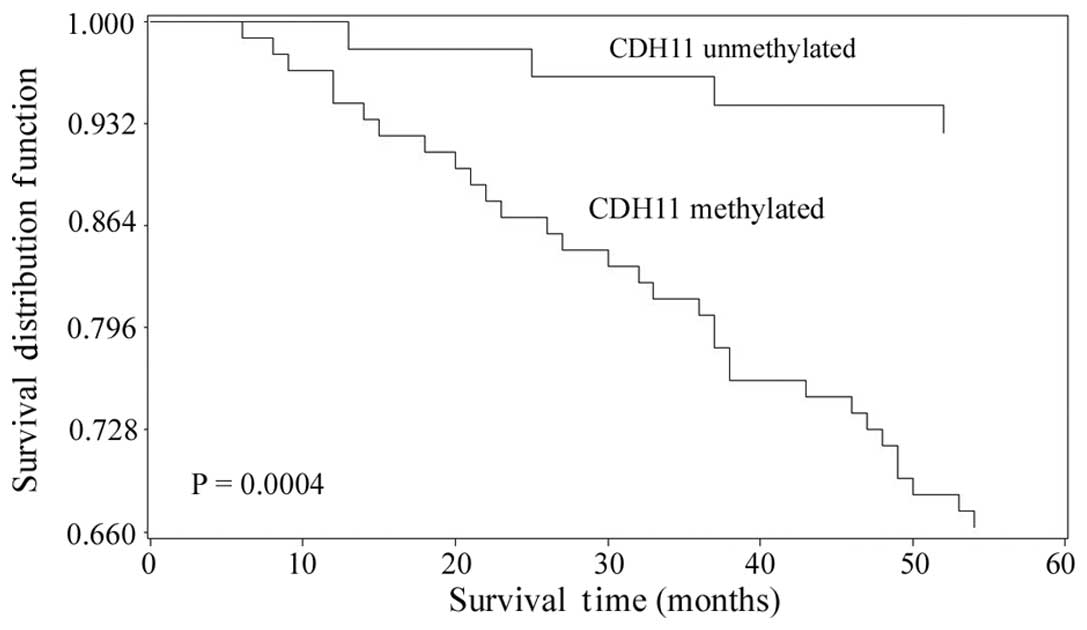|
1
|
Ploeg M, Aben KK and Kiemeney LA: The
present and future burden of urinary bladder cancer in the world.
World J Urol. 27:289–293. 2009. View Article : Google Scholar : PubMed/NCBI
|
|
2
|
Parkin DM: The global burden of urinary
bladder cancer. Scand J Urol Nephrol Suppl. 42:12–20. 2008.
View Article : Google Scholar
|
|
3
|
Siegel R, Naishadham D and Jemal A: Cancer
statistics, 2013. CA Cancer J Clin. 63:11–30. 2013. View Article : Google Scholar : PubMed/NCBI
|
|
4
|
Kim WJ, Kim EJ, Jeong P, et al: RUNX3
inactivation by point mutations and aberrant DNA methylation in
bladder tumors. Cancer Res. 65:9347–9354. 2005. View Article : Google Scholar : PubMed/NCBI
|
|
5
|
Kawamoto K, Enokida H, Gotanda T, et al:
p16INK4a and p14ARF methylation as a potential biomarker for human
bladder cancer. Biochem Biophys Res Commun. 339:790–796. 2006.
View Article : Google Scholar : PubMed/NCBI
|
|
6
|
Montgomery JS, Miller DC and Weizer AZ:
Quality indicators in the management of bladder cancer. J Natl
Compr Canc Netw. 11:492–500. 2013.PubMed/NCBI
|
|
7
|
Shariat SF, Milowsky M and Droller MJ:
Bladder cancer in the elderly. Urol Oncol. 27:653–667. 2009.
View Article : Google Scholar : PubMed/NCBI
|
|
8
|
Mueller J, Schrader AJ, Schrader M,
Schnoeller T and Jentzmik F: Management of muscle-invasive bladder
cancer. Minerva Urol Nefrol. 65:235–248. 2013.PubMed/NCBI
|
|
9
|
Pal SK, Milowsky MI and Plimack ER:
Optimizing systemic therapy for bladder cancer. J Natl Compr Canc
Netw. 11:793–804. 2013.PubMed/NCBI
|
|
10
|
Kobeissi LH, Yassine IA, Jabbour ME,
Moussa MA and Dhaini HR: Urinary bladder cancer risk factors: A
Lebanese case-control study. Asian Pac J Cancer Prev. 14:3205–3211.
2013. View Article : Google Scholar : PubMed/NCBI
|
|
11
|
Ghafouri-Fard S, Nekoohesh L and
Motevaseli E: Bladder cancer biomarkers: Review and update. Asian
Pac J Cancer Prev. 15:2395–2403. 2014. View Article : Google Scholar : PubMed/NCBI
|
|
12
|
Ding MX, Wang HF, Wang JS, et al: ppGalNAc
T1 as a potential novel marker for human bladder cancer. Asian Pac
J Cancer Prev. 13:5653–5657. 2012. View Article : Google Scholar : PubMed/NCBI
|
|
13
|
Yegin Z, Gunes S and Buyukalpelli R:
Hypermethylation of TWIST1 and NID2 in tumor tissues and voided
urine in urinary bladder cancer patients. DNA Cell Biol.
32:386–792. 2013. View Article : Google Scholar : PubMed/NCBI
|
|
14
|
Kim YK and Kim WJ: Epigenetic markers as
promising prognosticators for bladder cancer. Int J Urol. 16:17–22.
2009. View Article : Google Scholar : PubMed/NCBI
|
|
15
|
Kandimalla R, van Tilborg AA and Zwarthoff
EC: DNA methylation-based biomarkers in bladder cancer. Nat Rev
Urol. 10:327–335. 2013. View Article : Google Scholar : PubMed/NCBI
|
|
16
|
Deng Z, Niu G, Cai L, Wei R and Zhao X:
The prognostic significance of CD44V6, CDH11 and β-catenin
expression in patients with osteosarcoma. BioMed Res Int.
2013:4961932013. View Article : Google Scholar : PubMed/NCBI
|
|
17
|
Carmona FJ, Villanueva A, Vidal A, et al:
Epigenetic disruption of cadherin-11 in human cancer metastasis. J
Pathol. 228:230–240. 2012. View Article : Google Scholar : PubMed/NCBI
|
|
18
|
Li L, Ying J, Li H, et al: The human
cadherin 11 is a pro-apoptotic tumor suppressor modulating cell
stemness through Wnt/β-catenin signaling and silenced in common
carcinomas. Oncogene. 31:3901–3912. 2012. View Article : Google Scholar : PubMed/NCBI
|
|
19
|
Nakajima G, Patino-Garcia A, Bruheim S, et
al: CDH11 expression is associated with survival in patients with
osteosarcoma. Cancer Genomics Proteomics. 5:37–42. 2008.PubMed/NCBI
|
|
20
|
Lin YL, He ZK, Li ZG and Guan TY:
Downregulation of CDH13 expression promotes invasiveness of bladder
transitional cell carcinoma. Urol Int. 90:225–232. 2013. View Article : Google Scholar : PubMed/NCBI
|
|
21
|
Lin YL, Liu XQ, Li WP, Sun G and Zhang CT:
Promoter methylation of H-cadherin is a potential biomarker in
patients with bladder transitional cell carcinoma. Int Urol
Nephrol. 44:111–117. 2012. View Article : Google Scholar : PubMed/NCBI
|
|
22
|
Lin YL, Sun G, Liu XQ, Li WP and Ma JG:
Clinical significance of CDH13 promoter methylation in serum
samples from patients with bladder transitional cell carcinoma. J
Int Med Res. 39:179–186. 2011. View Article : Google Scholar : PubMed/NCBI
|
|
23
|
Oosterlinck W, Lobel B, Jakse G, et al
European Association of Urology (EAU) Working Group on Oncological
Urology: Guidelines on bladder cancer. Eur Urol. 41:105–112. 2002.
View Article : Google Scholar : PubMed/NCBI
|
|
24
|
Greene FL: The American Joint Committee on
Cancer: Updating the strategies in cancer staging. Bull Am Coll
Surg. 87:13–15. 2002.PubMed/NCBI
|
|
25
|
Babjuk M, Oosterlinck W, Sylvester R, et
al European Association of Urology (EAU): EAU guidelines on
non-muscle-invasive urothelial carcinoma of the bladder, the 2011
update. Eur Urol. 59:997–1008. 2011. View Article : Google Scholar : PubMed/NCBI
|
|
26
|
Wu Y, Zhang X, Lin L, et al: Aberrant
methylation of RASSF2A in tumors and plasma of patients with
epithelial ovarian cancer. Asian Pac J Cancer Prev. 15:1171–1176.
2014. View Article : Google Scholar : PubMed/NCBI
|
|
27
|
Nakajima G, Patino-Garcia A, Bruheim S, et
al: CDH11 expression is associated with survival in patients with
osteosarcoma. Cancer Genomics Proteomics. 5:37–42. 2008.PubMed/NCBI
|
|
28
|
Kaufman DS, Shipley WU and Feldman AS:
Bladder cancer. Lancet. 374:239–249. 2009. View Article : Google Scholar : PubMed/NCBI
|

















